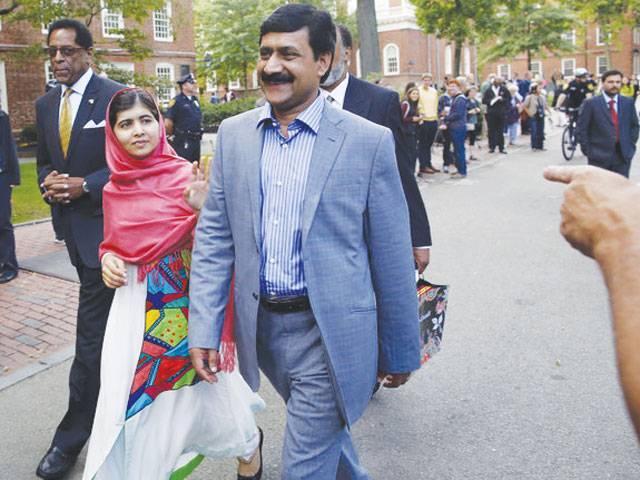Who’s a bigger threat to Malala Yousafzai, the Taliban or starstruck Westerners?
Malala, of course, is the 16-year-old Pakistani girl who was shot in the head by a Taliban gunman on Oct 9, 2012, because of her outspoken support for educating girls in Pakistan and her criticism of the fundamentalist group. She is also in the running for the Nobel Peace Prize, which will be announced Friday.
Now recovered from her wounds and living with her family in Britain, Malala continues to speak out. And that has earned her renewed enmity from the Taliban. As The Times’ Carol J. Williams reported Monday:
A Taliban spokesman, Shahidullah Shahid, told news agencies in Pakistan that Malala was shot for defaming Islam, not for her outspoken support for girls’ education, and that the group would try to attack her again. “She is not a brave girl and has no courage,” Agence France-Presse quoted Shahid as warning. “We will target her again and attack whenever we have a chance.”
Certainly, targeting 16-year-old girls for death simply for expressing support for educating girls is despicable. No modern civilized society should tolerate such sentiments. But these are not idle threats. The Taliban mean what they say. Malala’s high profile, her refusal to back down in the face of such threats, could very well get her killed.
How hard must it be for a teenage girl to be living under such a cloud?
In the New York Times on Monday, reporter Adam B Ellick recounts his role in forging Malala, hero of the West.
I met Malala in 2009, when she was determined to defy the odds and become a doctor. I spent six months making two documentaries about her life that helped bring her brave campaign to the world, transforming her into a public figure. After the Taliban tried to silence her, the New York Times wove the footage together into a single, 32-minute documentary.
Since the attack last October, I have at times struggled with a question journalists often confront: By giving her a platform, did I inadvertently play a role in her shooting? I wanted to understand how this all unfolded so I began combing through nearly 20 hours of unseen footage of the family long before they were coached by publicists, and before they had signed multimillion-dollar book and movie deals.
While my original documentary tells the story of Malala’s struggle for education in the face of the Taliban, this back story also raises some sobering and difficult questions. Malala was a brave young girl, advocating for a better future for all girls in her country, but was it fair for her to fight so publicly in such a dangerous environment? Or was she thrust into the limelight by adults captivated by the power of a child staring down the Taliban?
Perhaps no one can answer those questions. But if Malala is awarded the Nobel Peace Prize on Friday, how much more of a target will she become?
We in the West love her story of courage, of recovery, her willingness to speak out in a way that fits with our worldview. But in many ways she’s still a child. She has, hopefully, a full life ahead of her.
So maybe we should temper our respect for her with a little soberness, a little common sense - and plenty of regard for her safety.–The LA Times
Friday, April 19, 2024
Western praise could get Malala killed

8:27 AM | April 19, 2024
8:09 AM | April 19, 2024
Empowering Women: The Vision of Maryam Nawaz Sharif
8:37 PM | April 19, 2024
President Zardari confers Nishan-i-Imtiaz (M) award on Turkish CGS
8:23 PM | April 19, 2024
NA speaker suspends two MNAs for disruptive behavior during presidential address
8:20 PM | April 19, 2024
PM Shehbaz orders accelerating countrywide drive against smuggling
8:19 PM | April 19, 2024
LHC allows PTI to hold rally in NA-119
8:18 PM | April 19, 2024
A Tense Neighbourhood
April 19, 2024
Dubai Underwater
April 19, 2024
X Debate Continues
April 19, 2024
Hepatitis Challenge
April 18, 2024
IMF Predictions
April 18, 2024
Kite tragedy
April 19, 2024
Discipline dilemma
April 19, 2024
Urgent plea
April 19, 2024
Justice denied
April 18, 2024
AI dilemmas unveiled
April 18, 2024
ePaper - Nawaiwaqt
Advertisement
Nawaiwaqt Group | Copyright © 2024





